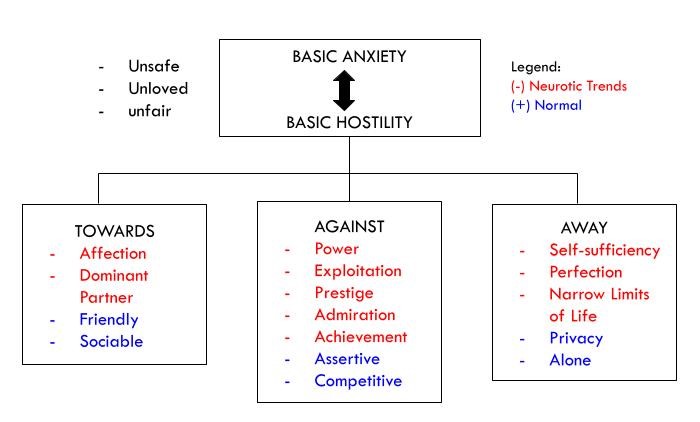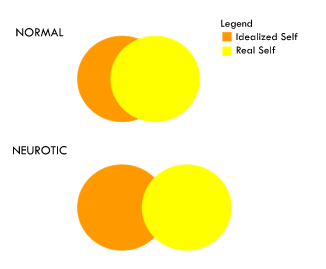Theories of Personality: Karen Horney
Biography
- 1885 - 1952
- Born near Hamburg, Germany
- Encouraged to study medicine by her mother
- Received her degree from University of Berlin
- Experienced challenges of having a career and children
- Moved to US in 1932
Neopsychoanalytic
- Reaction to Freud
- Humans motivated by need for security and love, not by sex and aggression
- Influence of gender experience
- More emphasis on social factors in influencing personality
- Level of warmth can affect personality
Safety Need
- Social forces in childhood, not biological forces influence personality
- No universal stages of development
- Childhood is dominated by need for security and freedom from fear
- Parents foster security by treating the child with warmth and affection
- Normality of personality development direct function of level of warmth and affection received by parents
Basic Anxiety
- Pervasive feeling of loneliness and helplessness
- Foundation of neurosis
- 4 ways we protect ourselves in childhood from basic anxiety:
- Securing love and affection
- Being submissive
- Attaining power
- Withdrawing
Neurotic Needs
Irrational defenses against anxiety that become a permanent part of personality and that affect behavior
Encompass the 4 ways of protecting ourselves against anxiety
10 Neurotic Needs
- Affection and approval (gaining affection)
- A dominant partner (submissive)
- Power (attaining power)
- Exploitation (attaining power)
- Prestige (attaining power)
- Admiration (attaining power)
- achievement/ambition (attaining power)
- Self-sufficiency (withdrawing)
- Perfection (withdrawing)
- Narrow limits to life (withdrawing)

3 categories of behaviors and attitudes toward oneself and others that express a person’s needs
Neurotic persons are compelled to act based on one of the neurotic trends:
- Movement toward others (compliant personality)
- Primary Modes of Relating to Others
- Moving toward (compliance): accepting one’s helplessness and becoming compliant
- Basic Orientations toward Life
- Self-effacing solution: an appeal to be loved
- Neurotic Trends
- Exaggerated need for affection and approval
- Need for a dominant power
- Movement against others (aggressive personality)
- Primary Modes of Relating to Others
- Moving against (hostility): rebelling and resisting others to protect one’s self from a threatening environment
- Basic Orientations toward Life
- Self-expansive solution: a striving for mastery
- Neurotic Trends
- Exaggerated need for power
- Need to exploit others
- Exaggerated need for social recognition/prestige
- Exaggerated need for personal admiration
- Exaggerated ambition for personal achievement
- Movement away from others (detached personality)
- Primary Modes of Relating to Others
- Moving away (detachment): isolating one’s self to avoid involvement with others
- Basic Orientations toward Life
- Resignation solution: a desire to be free of others
- Neurotic Trends
- Need to restrict one’s self within narrow boundaries
- Exaggerated need for self-sufficiency and independence
- Need for perfection and unassailability
Idealized Self-Image
Normal People
- Built on flexible, realistic, assessment of one’s abilities
Neurotic People
- Inflexible, unrealistic, self-appraisal
Tyranny of the Shoulds
- Used by neurotics to attain the idealized self
- Deny true self and behave in terms of what we think we should be doing
Externalization
- Reduce conflict caused by discrepancy between ideal and actual self

Feminine Psychology
- Psychological theory that focuses on women’s experiences
- Womb Envy
- Women have a superior role in sexual life due to ability to bear and nurse children; men experience intense envy
- Impressive achievements of men in creative fields may be seen as compensations for inability to bear children
Criticisms of Horney
- Theory of personality not as well constructed as Freudian theory
- Ignores roles of Sociology and Anthropology in influencing personality
- Observations too influenced by middle class America
Contributions of Horney
- Contribution to Feminist Psychology
- Influence on Erikson and Maslow
- More optimistic view of personality than Freud
- Accounts for social factors in shaping personality